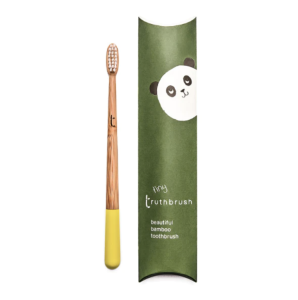Confused by the number of baby and kids’ toothbrushes on the market in the UK? That’s quite understandable. Wherever you look you’ll find a dazzling array of children’s toothbrushes in different sizes shapes and colours. But how do you know which one is best for your child’s dental care?
Here, we’ll go through some things to consider, including:
Below is a quick-reference guide to our top picks, but you’ll find lots more information if you continue reading. We have grouped our top toothbrush picks by age so you can easily find the one that suits you.
Teaching your child good dental hygiene is one of the seemingly endless things you need to do as a parent. We aim to make it a little bit easier, so read on for your guide to buying the best kids’ toothbrush for your child.
Note that this guide focuses on manual children’s toothbrushes. If you’re looking for a powered brush or want to know more about electric vs manual brushes, check out our guide to children’s electric toothbrushes.
Below is a quick-reference guide to our top picks, but you’ll find lots more information if you continue reading. We have grouped our top toothbrush picks by age so you can easily find the one that suits you.
Best Toothbrushes for Kids | ||
Baby banana teething toothbrush
| 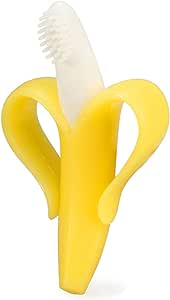 | |
Finger toothbrushes
| 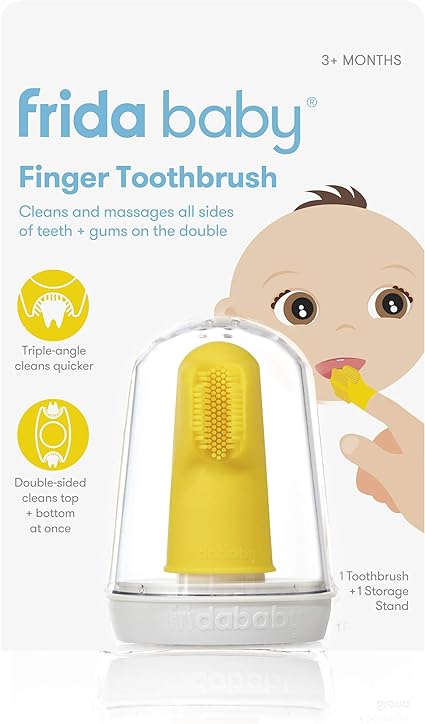 | |
Children’s timer toothbrush
| 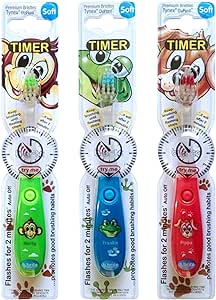 | |
Kids’ toothbrush with suction handle
| 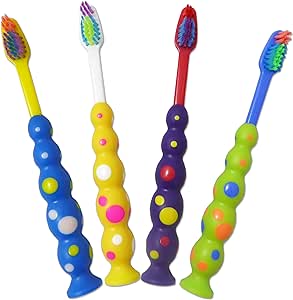 | |
Kids’ bamboo toothbrush
| 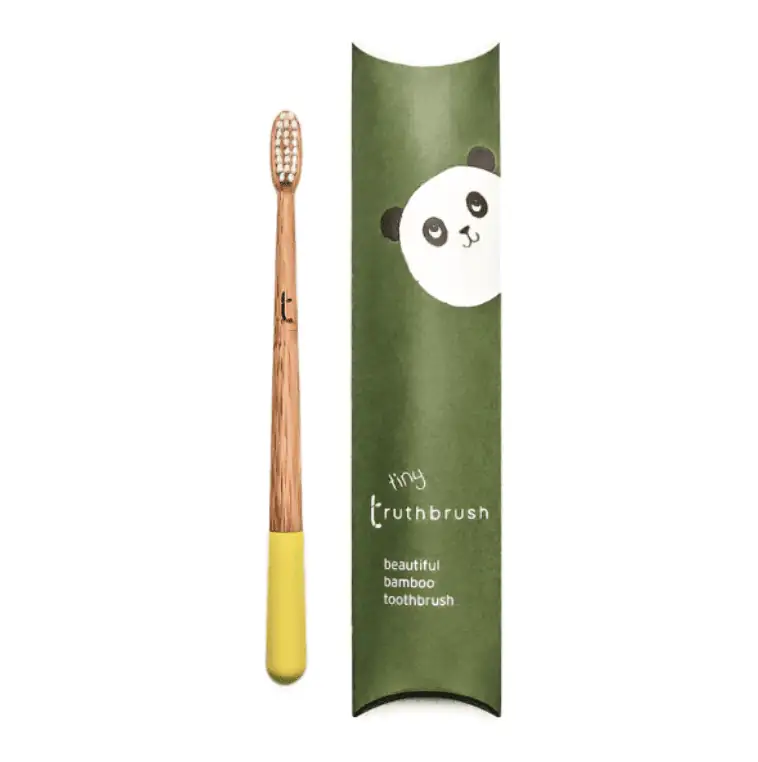 | |
In This Article
Choose the best kids’ toothbrush for their age
As children grow up, their teeth seem to change as quickly as they do. But you don’t need to wait until the baby’s first teeth appear; even before then you can start caring for their oral health and getting them into the habit of brushing.
From the first few teeth to a full set, through a mix of baby and adult teeth, all the way to their complete set of adult teeth, the best children’s toothbrush at each stage depends on how old your child is.
As your child grows, so does their mouth, so it’s important to choose a brush that’s the right size for their age. Beyond that, you will have different colours, characters, and even eco-friendly materials to choose from.
Growing up means teeth get stronger and gums less sensitive. Plus, your child will get better at holding and using a toothbrush.
All of these factors need to be taken into account when choosing your child’s toothbrush.
Best toothbrush for babies and toddlers
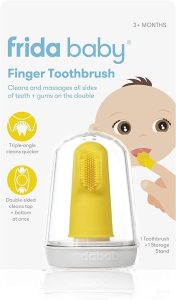
Believe it or not, you can start looking after your child’s mouth before they even have teeth! You can run a soft brush, or even a piece of gauze, over their gums after feeding to make sure natural sugars aren’t sticking around their gums. This also gets them used to having a brush in their mouth.
You can buy handy silicone brushes that fit over your finger to help with cleaning babies’ gums. These baby toothbrushes can also be really useful when your child’s first few teeth come through; your finger might be less scary than a traditional kids’ toothbrush.
As your child starts to go through teething and learns how to grip better, a Baby Banana Teething Toothbrush for Infants is a nice progression. Because it’s made from all silicone, it’s safe for your child to chew on when their mouth is hurting from all the teething (view some more teething relief remedies). It’s also easy to clean when it gets dropped on the floor – as it inevitably will.
Being able to use this baby banana toothbrush as a toy, as well as a brush, can help your child get used to toothbrushes. The double grip handle means that they can still hold on as you do the proper brushing around all their teeth for them.
Here is a video showing the banana toothbrush in action:
Regular toothbrushes for babies and toddlers are easy to find in supermarkets and chemists, as well as online. Just check the packaging to make sure the brush you choose is suitable for ages 0-2. The baby toothbrush should have a small head and very soft bristles.
Best Toothbrush for Kids Aged 3-7
Once your child’s grip gets better, you can buy a kids’ toothbrush that looks more like the one you use yourself, except they come with cartoon characters because kids get all the fun!
These kids’ toothbrushes have a light that flashes for two minutes, so as your child starts to take more responsibility for their teeth they can keep track of how long they’ve brushed.

Of course, you’ll also see children’s toothbrushes from Colgate, Aquafresh and other well-known brands when you’re out shopping. As long as they have soft bristles and a small enough head, the important thing is to choose one your child likes – whether because of the colour, shape, or character it features. It’s all about getting them to enjoy the process of brushing their teeth.
Another feature that can be useful at this age is a sucker at the end of the handle. This lets the toothbrush stand upright on your bathroom sink or shelf – no risk of it falling on the floor – and is easy for kids to grab. This set of 4 children’s toothbrushes with sucker handles is brightly coloured and is of excellent value.
Best Children’s Toothbrush for 8 Years and Up
By the age of seven or eight, your child should be capable of brushing their teeth by themselves. They’re probably still a little young for a full adult toothbrush but there are lots of junior toothbrushes with smaller heads and soft bristles for this age group.
By around the age of ten or eleven, they should be fine to start using an adult toothbrush. If you’re unsure, ask your dentist for their opinion.
It won’t harm your child to keep using junior models until they’re ready to change. If having funky colours and their favourite characters or celebrities on their toothbrush makes them brush twice a day, great!
Kids’ Bamboo Toothbrushes
With the current focus on avoiding single-use plastic, kids’ bamboo toothbrushes are becoming more popular. You can read more about these in our eco toothbrush guide. Some of the benefits of bamboo toothbrushes are:
- Reduce the amount of plastic that goes in the bin
- Use a renewable resource – bamboo grows very fast
- Bamboo is biodegradable; it will break down within 10 years
Although probably not suitable for very young children and babies, kids’ bamboo toothbrushes should be fine for children from around 2 years old. They’re a great way to introduce your child to be aware of the environment in their everyday actions. Again, look out for a brush with soft bristles and a small head, like this Truthbrush Kids’ Bamboo Toothbrush.
Designs are much more limited with bamboo toothbrushes than with plastic, but the more popular they become, the more likely we’ll see more kid-friendly designs. They might cost a little more too, but it’s not a huge difference in price given the environmental benefits. Buying in bulk online can make them more economical.
Truthbrush’s bamboo toothbrushes come in Sunshine Yellow and Cloud White. You can also purchase a bamboo toothbrush holder for your child’s bamboo toothbrush, or get the Children’s Tiny Truthbrush Bamboo Toothbrush and Travel Case Set.
Here’s a comparison of the pros and cons of plastic vs. bamboo toothbrushes for kids:
Plastic | Bamboo | |
Average price | £1 | £1.75 |
Lasts for… | 2-3 months | 2-3 months |
Time to decompose | Around 450 years | Around 10 years |
Designs | Cartoon and film characters, many colours | Shaped bamboo, limited colours and patterns |
Effective for brushing teeth | Yes | Yes |
How is a children’s toothbrush different to an adult one?
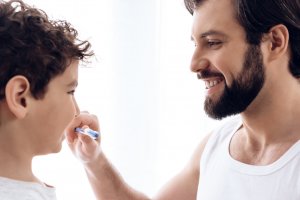
Kids’ teeth are a bit different to adult teeth, and their gums are more sensitive. It’s easy for their gums to become irritated from brushing, so choose a toothbrush that’s specially designed for kids.
Baby teeth are as important as adult teeth and need to be cared for in the same manner. It is important to supervise your child while brushing until they are older and it is a good idea to brush your teeth at the same time as your child.
Some of the golden rules that you can ask your child to follow: Brushing both in the morning and night before bedtime, only consuming water after they have brushed their teeth, and using a pea-sized amount of fluoridated toothpaste.
You can make brushing fun by getting toothbrushes that have your child’s favourite cartoon character, brushes with a timer that sings a song for the recommended brushing time or ones with a light that goes off when the time is up.
It is best practice to stand in front of the mirror and brush their teeth and you can advise them to focus on both the front and back teeth. Happy teeth and happier tots!
Dr Asha Ramesh
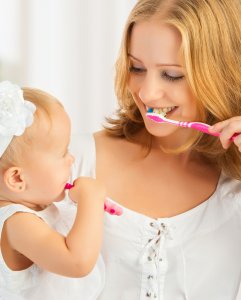
Some of the key things to look for when choosing the best children’s toothbrush for your child include:
- A small head so that it can reach all around the mouth and clean every surface of every tooth, especially at the back of the mouth
- A big handle because a child’s hand is less able to grip the smaller handles that most adult toothbrushes use
- A good grip to reduce the chances of your child dropping their toothbrush, or slipping as they brush and hurting themselves
- Soft bristles will make sure their gums don’t get irritated and painful – if brushing their teeth hurts then they won’t want to do it
- Round-ended bristles also help reduce any irritation, keeping things soft and comfy for them
- A bright design will help make things fun and engaging for your child so that teeth brushing doesn’t seem like a chore or something to dread
Read more about the best adult toothbrushes around in our separate guide.
How to use a kids’ toothbrush
The technique for brushing teeth is generally the same for children and adults, except that children don’t need as much toothpaste. We won’t go into the details now, but we have a complete guide to proper teeth brushing that you can refer to. Also find out what is the best baby or kids’ toothpaste for your child – it changes according to their age.
Involve your kids with teeth brushing early so that they know what to do and it becomes second nature. Children need help brushing their teeth up until around age 7. This is the age at which they develop the manual dexterity needed to brush thoroughly. If they resist your help, let them brush first and then finish off with a “special polish” to make sure nowhere is missed.
Letting your child choose their own toothbrush and toothpaste can really help make them feel more involved and willing to participate. There are some great children’s toothbrushes that have features like timers and teething rings attached, as we mentioned above.
Teach your child not to walk around with their toothbrush in their mouth, since there is a risk of injury if they fall.
Changing Your Child’s Toothbrush
Changing the type of brush your child uses as they get older is one thing, but you also need to make sure to replace worn-out brushes.
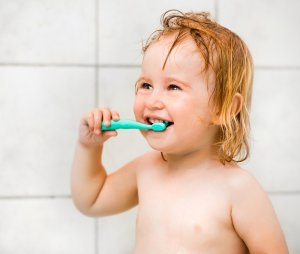
Just like with adults, a child’s toothbrush is going to get worn after regular use. As a general rule, you should change their toothbrush every three months.
However, keep an eye on the bristles of the brush they’re using. Once they start to fray or get pushed to the side and flattened, it’s time to change the brush. If your baby or child has a tendency to chew their brush, the bristles can get worn out quite quickly, so try to discourage this. Continuing to use a brush with frayed bristles can damage tooth enamel and gums.
It’s also a good idea to change your kid’s toothbrush every time they have had a cold so the germs don’t stick around.
If you’re using a kids’ bamboo toothbrush, remember to get rid of the bristles before you compost it or send it for recycling. Most bristles on bamboo handles are still made of soft nylon and aren’t biodegradable so they need to go into your normal family waste.
Conclusion
Your child will need different kinds of toothbrushes as they grow up. You can find lots of options to help them form the habits they’re going to need for a healthy mouth in the future.
The key to getting the right baby or kids’ toothbrush is finding one that doesn’t hurt them and makes brushing fun. If you’re unsure of when to change the size of your kid’s toothbrush, check with your dentist for the best advice for your child.
Always keep an eye on the condition of your child’s toothbrush, too. If it gets too worn down it will stop brushing effectively and may damage their teeth and gums.
By working with your child to look after their dental health now, you are going to stand them in good stead for the future. The earlier a child gets into good habits, the more likely they will stick. Picking the best kids’ toothbrush for them is just one aspect, but you can read more about how to take care of your child’s teeth for more advice.
FAQs
Why is it important to choose the right toothbrush for my child?
Choosing the right toothbrush for your child is important to prevent tooth decay and gum disease, as a toothbrush that is too big or too hard can harm their teeth and gums.
At what age should my child start using a toothbrush?
Your child can start using a toothbrush as soon as their first tooth appears. It’s important to start brushing your child’s teeth as soon as possible to establish good oral hygiene habits.
What should I look for when choosing a toothbrush for my child?
When choosing a toothbrush for your child, look for a brush that has soft bristles and a small head that can easily fit into their mouth. The handle should also be easy for your child to hold and grip.
Can my child use the same toothbrush as their sibling?
It’s best for each child to have their own toothbrush to prevent the spread of bacteria and infection and excessive wear and tear on the bristles, which can make the brush less effective at cleaning.
What are some of the best children’s toothbrushes in the UK?
Some of the best children’s toothbrushes in the UK include the Oral-B Stages Power Kids Electric Toothbrush, the Colgate Kids Minions Battery Toothbrush, and the Aquafresh Little Teeth Toothbrush.
What to Expect: Brushing Baby’s Teeth. Consulted 17th March 2023.
Bamwoo: How To Dispose of a Bamboo Toothbrush Properly. Consulted 17th March 2023.
The Telegraph: The stark truth about how long your plastic footprint will last on the planet. Consulted 17th March 2023.





